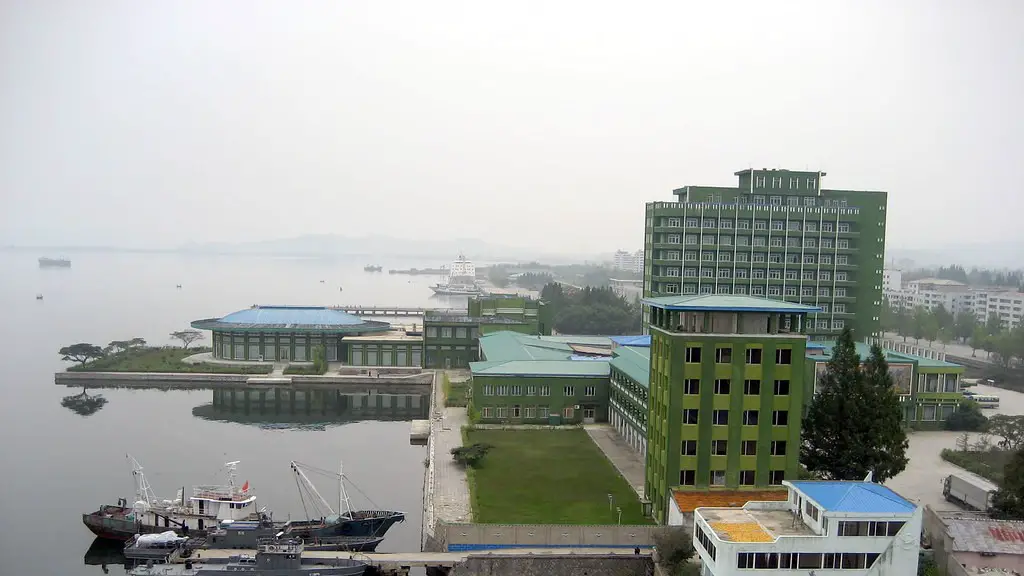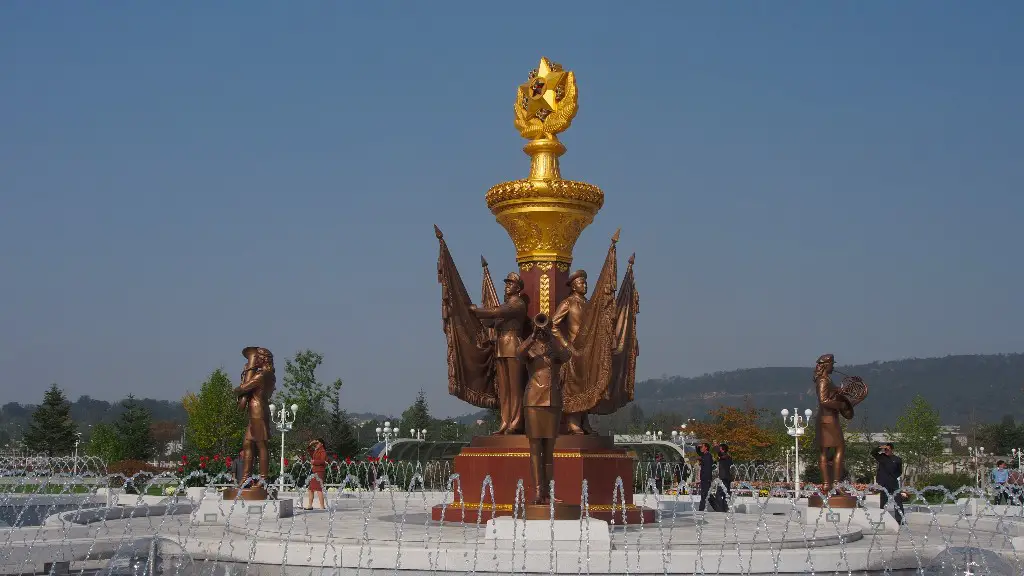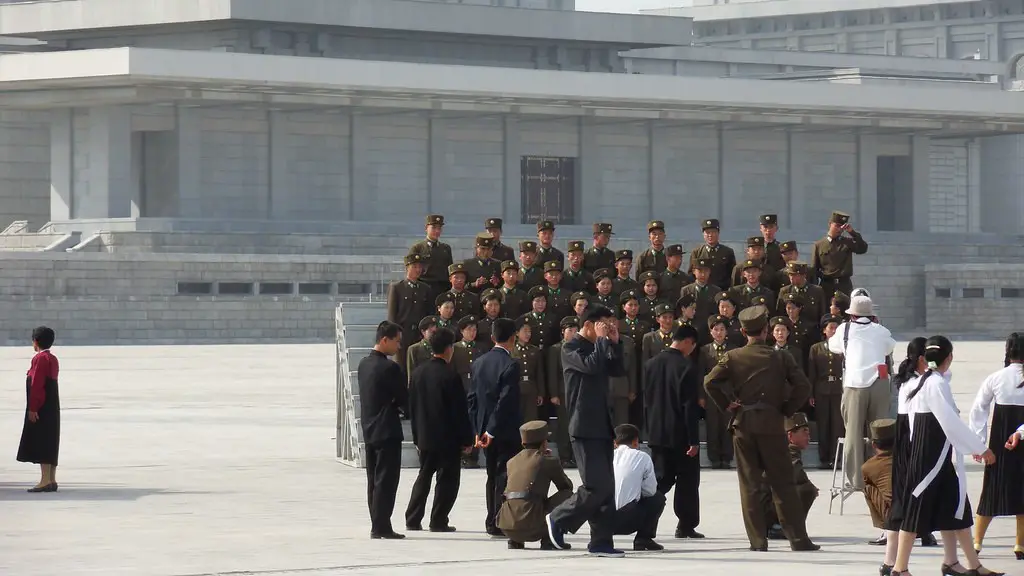Is North Korea Lying?
Is North Korea telling the truth about its military ambitions and activities? This is one of the most pressing issues facing the world today, with many questioning whether the secluded nation is adhering to its international obligations and agreements. In this article, we will look at the evidence for and against North Korea’s claims, as well as opinions from experts and attempts to bring peace to the Korean peninsula.
Since coming to power in the 1950s, North Korea has continually sought to develop its military capabilities. This has led to the nation building up a stockpile of both conventional and nuclear weapons, and test missiles at frequent intervals. Such actions have been seen as provocative and a violation of international law by the United Nations, and it has imposed multiple sanctions on North Korea in response.
However, North Korea has long claimed that its military activities are purely defensive and that it is developing its capability to protect itself against potential nuclear attacks from other nations. It has repeatedly stated that it has no intention of provoking conflicts or engaging in hostilities. Analysts point to the fact that North Korea has refused to back down in the face of international pressure, while still adhering to previous negotiated agreements, as evidence that its claims may not be entirely false.
At the same time, many experts have questioned whether North Korea is truly sincere in its stated desire for peace. Analysts point to its continued production of ballistic missiles, as well as its aggressive rhetoric towards the United States and South Korea, as evidence to suggest that North Korea may be lying about its true intentions.
Attempts to bring peace to the Korean peninsula and reduce tensions between North Korea and the United States have so far yielded little success. In 2018, Donald Trump and Kim Jong-Un met face to face for the first time, in an attempt to negotiate a denuclearisation agreement. However, these talks have so far failed to produce any tangible results, leaving the future of the region unclear.
In conclusion, it is difficult to conclusively say whether North Korea is indeed lying about its true intentions. The nation’s refusal to back down in the face of international pressure, combined with its continued production of ballistic missiles, make it difficult to trust its stated desire for peace. However, there have been attempts to reach negotiated agreements between the two sides, and it remains to be seen whether a breakthrough can be achieved.
Background Information
The Korean War, which lasted from 1950 to 1953, established a deep rift between North Korea and the West. North Korea has since developed one of the world’s largest standing armies and has repeatedly tested missiles throughout its history. This has led to increasing tensions between North Korea and the international community, with the United Nations imposing multiple sanctions in an attempt to discourage North Korean military activity.
These sanctions have had a significant impact on North Korean society, with the nation’s economy suffering due to lack of access to international markets. This has led to a decrease in living standards for many North Koreans and a heightened sense of paranoia amongst the population.
In 2018, Kim Jong Un met with Donald Trump in an attempt to reach a denuclearisation agreement. However, these talks have so far failed to produce any tangible results, leaving the situation unresolved.
Relevant Data
North Korea is estimated to have a stockpile of between 10-60 nuclear weapons and a diverse arsenal of ballistic missiles. The nation has also launched multiple satellites into space, including the Kwangmyongsong-4 in February 2016.
The economy of North Korea is heavily reliant on its trade with China, with an estimated 90% of the nation’s exports going to the Chinese market. This has led to increasing diplomatic tensions between the two nations, with China imposing several sanctions of its own.
In 2018, the United States imposed its own sanctions on North Korea, banning American companies from engaging in any form of trade with the nation. These sanctions have had a significant impact on the North Korean economy, with the nation’s GDP declining by 3.5% in 2019.
Perspectives From Experts
Experts have long questioned North Korea’s claims of peace and reconciliation, arguing that the nation’s actions do not match its stated desire for a better relationship with the international community. Many analysts believe that North Korea is in fact unwilling to give up its nuclear weapons, viewing them as a key deterrent to potential military action.
On the other hand, some analysts have pointed to North Korea’s previous willingness to negotiate as evidence that it may be sincere in its statements. North Korea has so far refused to back down in the face of international pressure, while still adhering to previous negotiated agreements, suggesting that it may not be lying about its intentions.
Analysis and Insights
The situation on the Korean peninsula remains tense and uncertain, with analysts and experts divided as to whether North Korea is truly sincere in its desire for peace. While the nation has been willing to negotiate in the past, its continued production of ballistic missiles and aggressive rhetoric suggest that it does not intend to give up its nuclear weapons.
At the same time, North Korea is a deeply impoverished nation with a weak economy and a citizenry who are increasingly frustrated with their living conditions. The imposition of international sanctions has only made the situation worse, and it remains to be seen how the nation will respond to further pressure.
Ultimately, while North Korea’s intentions may be unclear, it is clear that there needs to be further dialogue between the two sides if a peaceful resolution is to be achieved.
Impact of North Korea’s Actions
The actions of North Korea on the international stage have had a significant impact on the wider world. The nation’s provocative rhetoric and refusal to comply with international laws has sparked fears of nuclear conflict, making it one of the most volatile states in the world.
The fear and uncertainty generated by North Korea’s actions has also led to increased military spending by the United States and its allies, in an attempt to counter any potential threats posed by the nation. This has had a hugely detrimental effect on the U.S. economy, with military spending now accounting for close to 20% of the nation’s total budget.
At the same time, North Korea’s nuclear ambitions have caused a wave of panic around the world, with many nations now re-evaluating their own security policies in an attempt to avert any potential conflict.
International Responses
In response to North Korea’s nuclear ambitions, the United Nations has imposed multiple rounds of sanctions on the nation. The goal of these sanctions is to deter North Korea from developing its nuclear program, as well as to incentivise it to comply with international law.
Most recently, in 2017, the UN Security Council unanimously voted to impose a series of dramatic sanctions on North Korea, banning it from exporting coal, iron, lead, and seafood and significantly reducing its access to oil and petrol. These sanctions have had a severe impact on the North Korean economy, with estimates suggesting that they have cost the nation over $3 billion.
At the same time, the United States has also engaged in attempts to reach a peaceful resolution to the conflict, with Donald Trump and Kim Jong Un meeting face to face in 2018 in an attempt to negotiate a denuclearisation agreement.
However, the two sides have so far failed to reach an agreement, and it remains to be seen whether a breakthrough can be achieved.
Social Media Reactions
The situation on the Korean Peninsula has been a major talking point amongst social media users, with many expressing their opinions on the matter. On Twitter and other platforms, users have shared opinions and ideas about how the situation should be resolved, with many advocating for harsher sanctions on North Korea.
At the same time, numerous petitions have been started calling for a peaceful resolution to the conflict, with many of these garnering thousands of signatures. Social media has also been used to spread awareness of the situation, with users sharing stories and information about the situation.
Overall, it is clear that the issue is of great concern to many people, with social media providing an outlet for users to express their opinion on the matter.
Opinions of North Korea
Views towards North Korea vary greatly across the world. In the United States and its allies, many view North Korea as a rogue state that needs to be contained, while in other countries there is more sympathy towards the nation and its citizens.
In South Korea, the situation is particularly complicated. Despite the nation’s history of animosity with North Korea, a recent survey has found that the majority of South Koreans are in favour of reunification between the two countries. This has been interpreted as a sign of hope for the future, with many hoping for a peaceful resolution to the conflict.
In China, there is a mix of support and criticism for North Korea. On one hand, the Chinese government has sided with Pyongyang in international disputes, while on the other hand, popular opinion in China is mostly negative towards North Korea.
Overall, it is clear that North Korea is a hugely divisive issue, with a wide range of opinions held across the world.





